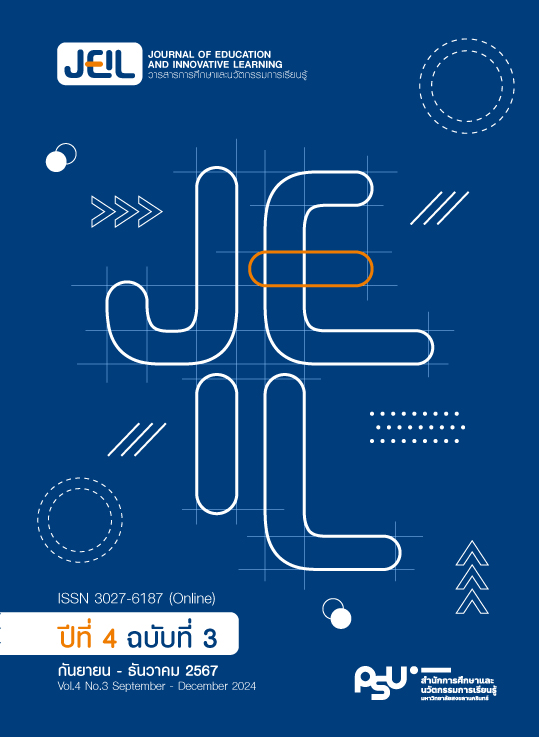ผลของการจัดการเรียนรู้แบบโครงงานเป็นฐานต่อสมรรถนะในการประยุกต์ใช้ภูมิปัญญาเพื่อการสร้างเสริมสุขภาพของนักศึกษาพยาบาล
Main Article Content
บทคัดย่อ
การวิจัยครั้งนี้เป็นการวิจัยแบบกึ่งทดลองแบบแผนการวิจัยกลุ่มเดียววัดก่อนและหลังการทดลองมีวัตถุประสงค์เพื่อเปรียบเทียบความรู้ของนักศึกษาพยาบาลก่อนและหลังการเรียนในหัวข้อการประยุกต์ใช้ภูมิปัญญาเพื่อการสร้างเสริมสุขภาพการจัดการเรียนรู้แบบโครงงานเป็นฐาน ศึกษาผลของการจัดการเรียนรู้แบบโครงงานเป็นฐานต่อสมรรถนะในการประยุกต์ใช้ภูมิปัญญาเพื่อการสร้างเสริมสุขภาพของนักศึกษาพยาบาล และศึกษาความพึงพอใจของนักศึกษาพยาบาลที่มีต่อการจัดการเรียนการสอนโดยใช้โครงงานเป็นฐาน กลุ่มตัวอย่างคือนักศึกษาพยาบาลชั้นปีที่ 2 คณะพยาบาลศาสตร์ มหาวิทยาลัยอุบลราชธานี จำนวน 105 คน เครื่องมือที่ใช้ในการวิจัยคือแผนการจัดการเรียนรู้รายวิชาการสร้างเสริมสุขภาพในหัวข้อการประยุกต์ใช้ภูมิปัญญาเพื่อการสร้างเสริมสุขภาพตามช่วงวัย เครื่องมือที่ใช้ในการเก็บข้อมูลคือ 1) ข้อสอบประเมินความรู้แบบเลือกตอบ มีค่า KR-20=0.70 2) แบบประเมินสมรรถนะในการประยุกต์ใช้ภูมิปัญญาเพื่อการสร้างเสริมสุขภาพ มีค่าสัมประสิทธิ์อัลฟ่าของครอนบาค 0.959 และ 3) แบบประเมินความพึงพอใจต่อการจัดการเรียนรู้แบบโครงงานเป็นฐาน มีค่าสัมประสิทธิ์อัลฟ่าของครอนบาค 0.954 วิเคราะห์ข้อมูลโดยใช้สถิติเชิงพรรณนา และ Paired-sample t-test ผลการวิจัยพบว่ากลุ่มตัวอย่างมีค่าเฉลี่ยคะแนนความรู้หลังเรียนสูงกว่าก่อนเรียนอย่างมีนัยสำคัญทางสถิติที่ระดับ P<0.01 ผลการจัดการเรียนรู้แบบโครงงานเป็นฐานต่อสมรรถนะในการประยุกต์ใช้ภูมิปัญญาเพื่อการสร้างเสริมสุขภาพอยู่ในระดับเห็นด้วยมากที่สุด ความพึงพอใจต่อการจัดการเรียนรู้แบบโครงงานเป็นฐานอยู่ในระดับพึงพอใจมากที่สุด
Article Details

อนุญาตภายใต้เงื่อนไข Creative Commons Attribution-NonCommercial-NoDerivatives 4.0 International License.
เนื้อหาและข้อมูลในบทความที่ตีพิมพ์ในวารสารการศึกษาและนวัตกรรมการเรียนรู้ ถือเป็นข้อคิดเห็นและความรับผิดชอบของผู้เขียน ซึ่งกองบรรณาธิการวารสาร ไม่จำเป็นต้องเห็นด้วยหรือร่วมรับผิดชอบใด ๆ และไม่สงวนสิทธิ์การคัดลอกบทความเพื่อใช้ประโยชน์ทางวิชาการ แต่ให้อ้างอิงข้อมูลแสดงที่มาของบทความทุกครั้งที่นำไปใช้ประโยชน์
เอกสารอ้างอิง
Best, W. J., & Kahn, V. J. (1993). Research in education (7th ed.). Boston: Allyn and Bacon
Donkram, I., Budseeta, P., & Prasoptham, J. (2022). The Integrated teaching of 3 subjects to marketing students of KPRU using the project based approach with a project obtained from the Faculty's missions of academic service, research, and cultural preservation. The Golden Teak: Humanity and Social Science Journal, 28(3), 66-80. Retrieved from https://so05.tci-thaijo.org/index.php/tgt/article/view/251092 [in Thai]
Guo, P., Saab, N., Post, S. L., & Admiraal, W. (2020). A review of project-based learning in higher education: Student outcomes and measures. International Journal of Educational Research, 102, 101586. doi:10.1016/j.ijer.2020.101586
Hatari, L., Marsono, & Yoto. (2022). The effect of the project-based learning model on the soft skill of vocational school students. Technium Social Science Journal, 24, 180-193
Klahan, P., & Ponegrn, W. (2021). Development learning activities based on a design thinking process and project based learning to enhance innovators in grade 10 students development learning activities based on a design thinking process and project based learning to enhance innovators in grade 10 students. Journal of Education Studies, 49(2), 1-16. doi:10.14456/educu.2021.34 [in Thai]
Koonkaew, A. (2017). Statistics for research. Bangkok: Chulalongkorn University Printing House [in Thai]
Loyens, S. M. M., Van Meerten, J. E., Schaap, L., & Wijnia, L. (2023). Situating higher-order, critical, and critical-analytic thinking in problem- and project-based learning environments: a systematic review. Educational Psychology Review, 35(2), 39. doi:10.1007/s10648-023-09757-x
Nuiplot, N. (2021). Developing students systematic thinking and problem solving skills using project-based learning in science subject of general education courses. Journal of Education and Innovative Learning, 1(1), 45-59. Retrieved from https://so06.tci-thaijo.org/index.php/jeil/article/view/248023 [in Thai]
Office of the Basic Education Commission. (2021). Project-based learning: PBL. Bangkok: N.A. Rattana trading limited partnership. [in Thai]
Parra-Anguita, L, López-Franco, M. D., Martínez-Galiano, J. M., González-Cabrera, M., Moreno-Cámara, S., & Granero-Moya, N. (2023). evaluation of the use of project-based learning in the nursing degree. Nursing Reports, 13(4), 1648-1657. doi:10.3390/nursrep13040136
Pitiporntapin, S., Boonsoong, B., & Yokyong, S. (2021). Development of undergraduate student’s scientific drawing competency and satisfaction towards project-based learning in biology drawing course. Journal of Education Naresuan University, 23(4), 354-368. Retrieved from https://so06.tci-thaijo.org/index.php/edujournal_nu/article/view/247999 [in Thai]
Sarayuthpitak, J. (2023). Health education learning management in the 21st century. Bangkok: Chulalongkorn University Printing House [in Thai]
Simswat, G. (2022). Community-based learning in 21st century among the outbreak of coronavirus disease 2019 (COVID-19). Srilangchang Research Journal, 2(6), 47-55. Retrieved from https://ojs.mbuslc.ac.th/index.php/srj/article/view/151 [in Thai]
Thongaime, A. (2018). Project based learning for developing student in the 21st Century. Valaya Alongkorn Review Journal, 8(3), 185-199. Retrieved from https://so06.tci-thaijo.org/index.php/var/article/view/163191 [in Thai]
Thonghaew, S., & Chaijaroen, K. (2020). Enhancing/promoting the 21st century learning skills of Chinese major students: project-based learning (PBL). Journal of Modern Learning Development, 5(5), 1-12. Retrieved from https://so06.tci-thaijo.org/index.php/jomld/article/view/243829 [in Thai]


